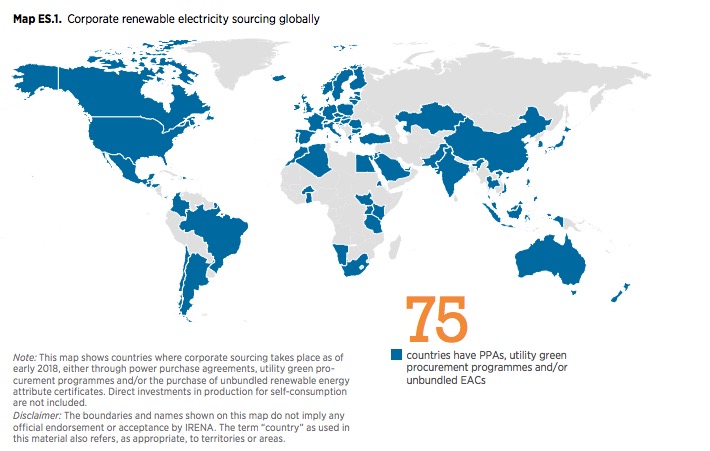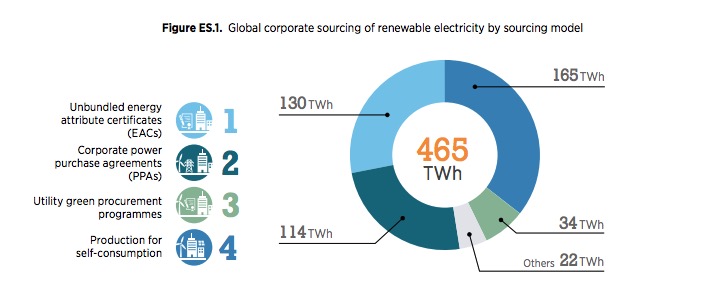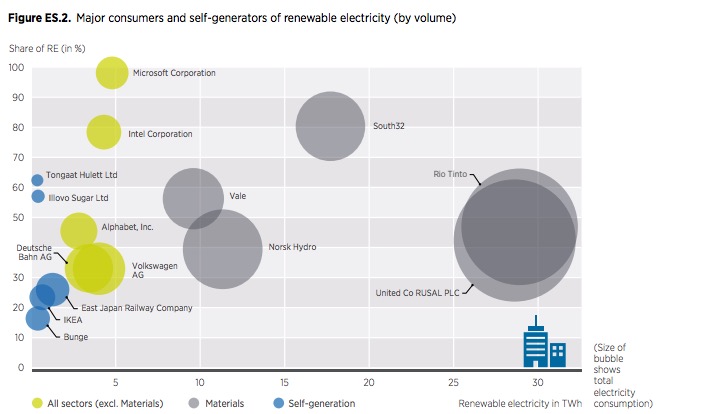INTERNATIONAL RENEWABLE ENERGY AGENCY (IRENA)
Abbreviations
- EAC Energy Attribute Certificate
- GICS Global Industry Classification Standard
- GW gigawatt
- IPP Independent Power Producer
- IRENA International Renewable Energy Agency
- IT Information Technology
- kWh kilowatt-hour MW megawatt
- MWh megawatt-hour
- PPA Power Purchase Agreement
- PV photovoltaic
- SME Small and Medium-sized Enterprises
- TWh terawatt-hour
Glossary
- Additionality – The net incremental renewable capacity deployed or renewable energy generated as a direct result of corporate sourcing of renewable energy beyond what would occur in its absence.
- Corporation – Publicly or privately owned company.
- Corporate power purchase agreement (PPA) – An arrangement under which a company enters into a long-term contract with an independent power producer or a utility and commits to purchasing a specific amount of renewable electricity or the output from a specific asset (sleeved or virtual), at an agreed price.
- Corporate sourcing of renewable electricity – A company actively procuring or self-generating renewable electricity to supply its own operations.
- Energy attribute certificate (EAC) – A contractual instrument that represents information about the origin of the energy generated. Various energy attribute certificates exist in a variety of markets, e.g., guarantees of origin (GOs) in Europe, renewable energy certificates (RECs) in the United States and international certificates – such as I-RECs. In most markets. Unbundled EACs can be purchased separately from the generated electricity.
- Green procurement from utility or electric supplier / Utility green procurement – Allows the corporate buyer to purchase renewable electricity through either green premium products or a tailored renewable energy contract, such as the green tariff programme offered by some utilities.
- Renewable energy – All forms of energy produced from renewable sources in a sustainable manner, which include, inter alia: bioenergy; geothermal energy; hydropower; ocean energy, including tidal, wave and ocean thermal energy; solar energy; and wind energy.
- Sleeved PPA – A contract under which the developer sells the electricity and associated attributes directly to a corporate off taker.
- Virtual PPA – A PPA contract under which the developer sells its electricity in the spot market and then settles the difference between the variable market price and the strike price with the corporate off-taker that receives the generated electricity certificates – also known as Financial PPAs.
Executive Summary
More and more companies around the world are voluntarily and actively procuring or investing in self-generation of renewable energy. Driven by the last decade’s unprecedented reduction in the cost of renewables in combination with a growing demand for corporate sustainability among investors and consumers, renewables have become an attractive source of energy.
Corporate sourcing of renewables has the potential to drive significant additional investment in renewable energy. With the right framework in place, it can also help accelerate the energy transformation and move the world closer to achieving the Paris Agreement’s objective of keeping the rise in global average temperatures to well below 2°C above pre-industrial levels.
As the first global comprehensive analysis of corporate sourcing of renewable electricity, this report highlights the latest trends and provides recommendations to more fully exploit its potential. The analysis builds on data collected from the member states of the International Renewable Energy Agency (IRENA) and from more than 2 400 large corporate entities headquartered in more than 40 countries.
The overall findings indicate that corporate sourcing occurs in roughly a third of the world’s countries. The report also shows that there is substantial scope to further enable corporate entities to source more renewable electricity and ensure that their efforts result in additional deployment. The analysis further suggests that while roughly one in five corporations has committed to renewable electricity targets, an opportunity exists to strengthen these targets and ambitions across all industry sectors.
01 Corporate sourcing of renewable electricity is a growing global trend, already seen in more than 70 countries around the world. The majority of companies reporting active sourcing are head-quartered in Europe and North America, with emerging markets on the rise.
Key findings
As of early 2018, companies sourced renewable electricity in 75 countries either through power purchase agreements (PPAs), utility green procurement programmes or unbundled energy attribute certificates (EACs) (see Map ES.1). Countries in Europe and North America continue to account for the bulk of corporate sourcing and are home to a large number of companies that are actively procuring renewables not only in the country where they are headquartered but also for their operations around the world. Lately, rising demand for renewable electricity has been noted among companies headquartered in the Asia Pacific region and Latin America. In Africa and the Middle East, few corporate procurement deals have been struck so far, but the region promises high potential.
02 The world market for corporate sourcing of renewables in 2017 reached about 465 terawatt-hours, placing it close to France’s overall electricity demand.
Active corporate sourcing of renewable electricity reached 465 terawatt-hours (TWh) in 2017, representing approximately 3.5% of total electricity demand in the Commercial & Industrial sector, and 18.5% of total renewable electricity demand in the Commercial & Industrial sector (see Figure ES.1). Production for self-consumption is the most common sourcing model, followed by the purchase of unbundled energy attribute certificates (EACs) and power purchase agreements (PPAs).
03 Companies sourcing renewable electricity come from various sectors, demonstrating that the trend is widespread and dynamic.
According to the data from 2 410 companies analysed, about 200 companies reported that more than half of the electricity they consumed was sourced from renewables; 50 companies reported a share of 100%. Companies sourcing renewable electricity come from a diverse set of sectors and geographic areas. By volume, the majority of renewable electricity was consumed in the Materials sector (165 TWh), which includes mining, pulp and paper, and chemicals (see Figure ES.2). The highest shares of renewable electricity consumption are found in the Financial (24%) and Information Technology (12%) sectors.
04 Corporate demand for renewable electricity has the potential to drive investment in renewables and accelerate the global energy transformation.
Companies in the Commercial & Industrial sector account for about two thirds of the world’s end-use of electricity. As their demand for renewable energy increases, they have the potential to play an important role in driving investment in renewables and contributing to global climate objectives. IRENA analysis projects that to achieve a global energy transformation that can deliver on the climate objectives set in the Paris Agreement, the overall share of renewables in total electricity use would need to reach at least 85% by 2050, which translates into 19 000 TWh for the Commercial & Industrial sector. In the current trajectory, corporate global demand for renewable electricity will grow to at least 2 150 TWh by 2030 and 3 800 TWh by 2050 (see Figure ES.3). This would correspond to only 20% of the required renewable electricity demand in the C & I sector in 2050, still not of the growth rate required. More than 111 companies have reached levels of in between 85-100% of renewable electricity sourcing, showing that high ambitions and significant acceleration of uptake is feasible.
To enable the full energy transformation, corporate renewable energy sourcing will need to go beyond the electricity sector and focus on all end-uses as well as energy efficiency measures.
05 Although more than half of the analysed companies source renewable electricity, only 17% have a target in place. Significant potential exists to strengthen corporate renewable electricity commitments.
Setting a specific renewable electricity target is still uncommon among companies. Although almost half of the companies analysed are actively sourcing renewable electricity, only 17% reported having a target. While only a relatively low number of companies are committing to a renewable electricity target, many more have actually set emission reduction targets. Of the existing renewable electricity targets, three quarters are shortterm and will expire before 2020. This presents a significant opportunity to strengthen corporate ambitions in the years to come. Half of the companies that have a target in place have committed to sourcing more than 80% of their electricity from renewable resources. In addition to environmental and social benefits, such as cutting emissions and promoting corporate social responsibility, the economic benefits of sourcing renewables may also include cost savings, long-term price stability, security of supply and the possibility of new business opportunities.
Download full version (PDF): Corporate Sourcing of Renewables
About the International Renewable Energy Agency
www.irena.org
The International Renewable Energy Agency (IRENA) is an intergovernmental organisation that supports countries in their transition to a sustainable energy future, and serves as the principal platform for international cooperation, a centre of excellence, and a repository of policy, technology, resource and financial knowledge on renewable energy. IRENA promotes the widespread adoption and sustainable use of all forms of renewable energy, including bioenergy, geothermal, hydropower, ocean, solar and wind energy in the pursuit of sustainable development, energy access, energy security and low-carbon economic growth and prosperity.









 RSS Feed
RSS Feed